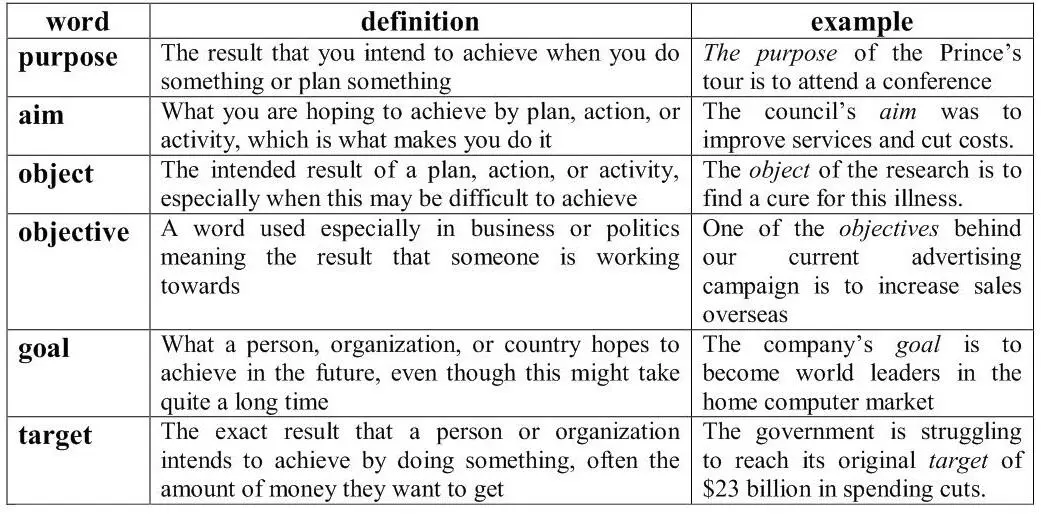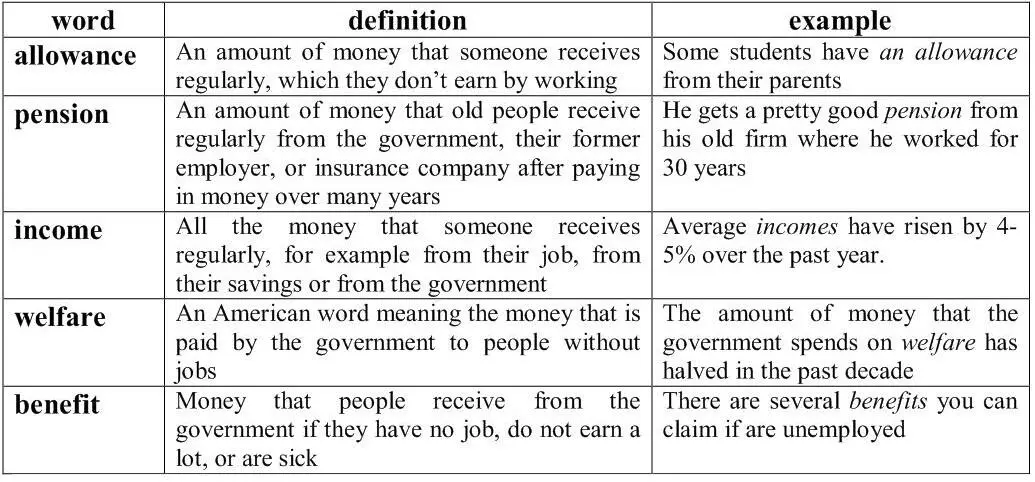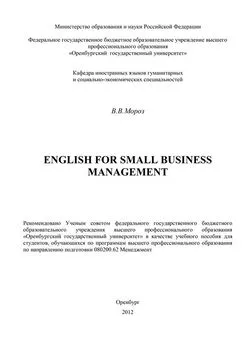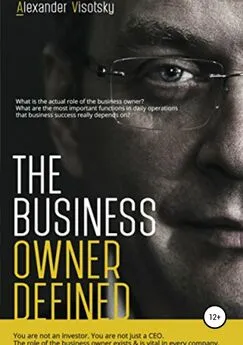Виктория Мороз - English for Small Business Management
- Название:English for Small Business Management
- Автор:
- Жанр:
- Издательство:Литагент БИБКОМ
- Год:2012
- Город:Оренбург
- ISBN:нет данных
- Рейтинг:
- Избранное:Добавить в избранное
-
Отзывы:
-
Ваша оценка:
Виктория Мороз - English for Small Business Management краткое содержание
English for Small Business Management - читать онлайн бесплатно ознакомительный отрывок
Интервал:
Закладка:
Special features of family firm management.
The complexity of relationships in family firms creates a demand for enlightened management. To a considerable extent, this just means good professional management. However, certain special techniques are useful in dealing effectively with the complications inherent in the family firm.
The Need for Good Management
Good management is necessary for the success of any business, and the family firm is no exception. Significant deviations for family reasons from what we might call good management practices, therefore, only serve to weaken the firm. Such a course of action runs counter to the interests of both the firm and the family. For the benefit of both, we suggest three management concepts that are particularly relevant to the family firm:
1 A family firm must be able to rely on the competence of its professional and managerial personnel. It cannot afford to accept and support family members who are incompetent or who lack the potential for development.
2 Favoritism in personnel decisions must be avoided. If possible, the evaluation of family members should involve the judgment of non-family members – those in supervisory positions, outside members of the board of directors, or managers of other companies in which family members have worked.
3 Plans for succession, steps in professional development, and intentions regarding changes in ownership should be developed and discussed openly. Founders who recognize the need for managing the process of succession can work out plans carefully rather than drift toward it haphazardly. Lack of knowledge regarding the plans and intentions of key participants creates uncertainty and possible suspicion. The planning process can begin as the founder or the presiding family member shares his or her dream for the firm and family participation in it.
The family firm is a business – a competitive business. The observance of these and other fundamental precepts of management will help the business thrive and permit the family to function as a family. Disregard of such considerations will pose a threat to the business and impose strains on family relationships.
1.3.3 Exercise 3. Read the text and render the main idea of it
Vocabulary notes:
consideration – рассмотрение, обсуждение, внимание, соображение;
inside track – выгодное положение, преимущество;
advancement – успех, прогресс, продвижение;
frustration – расстройство (планов), крушение (надежд), разочарование;
to negotiate – вести переговоры, договариваться;
to buy out – выкупать;
to aspire – стремиться;
feud – длительная вражда, междоусобица;
to perceive – воспринимать, понимать, осознавать, постигать, ощущать;
hazard – риск, опасность;
to plague – досаждать, надоедать, беспокоить.
Nonfamily Employees in a Family Firm
Even those employees who are not family members are affected by family considerations. In some cases, their opportunities for promotion are lessened by the presence of family members who seem to have the inside track. What parent is going to promote an outsider over a competent daughter or son who is being groomed for future leadership? The potential for advancement of non family members, therefore, may be limited, and they may experience a sense of unfairness and frustration.
One young business executive, for example, worked for a family business that operated a chain of restaurants. When hired, he had negotiated a contract that gave him a specified percentage of the business based on performance. Under this arrangement, he was doing extremely well financially – that is, until the owner called on him to say, "I am here to buy you out." When the young man asked why, the owner replied, "Son, you are doing too well, and your last name is not the same as mine!"
The extent of limitations on non-family employees will depend on the number of family members active in the business and the number of managerial or professional positions in the business to which non-family employees might aspire. It will also depend on the extent to which the owner demands competence in management and maintains an atmosphere of fairness in supervision. To avoid future problems, the owner should make clear, when hiring nonfamily employees, the extent of opportunities available and identify the positions, if any, that are reserved for family members.
Those outside the family may also be caught in the crossfire between family members who are competing with each other. Family feuds make it difficult for outsiders to maintain strict neutrality. If a non-family employee is perceived as siding with one of those involved in the feud, he or she will lose the support of other family members. Hard-working employees often feel that they deserve hazard pay for working in a firm plagued by an unusual amount of family conflict.
1.4 Homereading. Transfer of Ownership
1.4.1 Exercise 1. Remember the following terms:
succession – наследование, правопреемство;
inheritance – наследование, наследство;
estate – имущество, состояние;
share – доля, часть, пай; брит. акция;
holdings – вклады;
to bequeath – завещать имущество;
tax – налог;
warehouse – склад, хранилище, оптовый магазин;
distributor – агент по продаже, оптовый торговец;
assets – активы, средства, капитал, фонды, имущество;
business property – собственность фирмы;
monetary values – денежные ценности.

A final and often complex step in the succession process in the family firm is the transfer of ownership. Questions of inheritance affect not only the leadership successor but also other family members having no involvement in the business. In distributing their estate, parents-owners typically wish to treat all their children fairly, both those involved in the business and those on the outside.
One of the most difficult decisions is determining the future ownership of the business. If there are several children, for example, should they all receive equal shares? On the surface, this seems to be the fairest approach. However, such an arrangement may play havoc with the future functioning of the business. Suppose that each of five children receives a 20 percent ownership share even though only one of them is active in the business. The child active in the business – the leadership successor – becomes a minority stockholder completely at the mercy of relatives on the outside.
Ideally, the founder has been able to arrange his or her personal holdings to create wealth outside the business as well as within it. In this way, he or she may bequeath comparable shares to all heirs while allowing business control to remain with the child or children active in the business.
Tax considerations are relevant, of course, and they tend to favor gradual transfer of ownership to all heirs. As noted above, however, transfer of equal ownership shares to all heirs may be inconsistent with future efficient operation of the business. Tax laws should not be allowed to blind one to possible adverse effects on management.
One creative ownership transfer plan was worked out by a warehouse distributor in the tire industry. The distributor's son and probable successor was active in the business. The distributor's daughter was married to a college professor at a small southern university. Believing the business to be their most valuable asset, the owner and his wife were concerned that both the daughter and the son receive a fair share. Initially, the parents decided to give the business real estate to their daughter and the business itself to their son, who would then pay rent to his sister. After discussing the matter with both children, however, they developed a better plan whereby both the business property and the business would go to the son.
The daughter would receive all nonbusiness assets plus an instrument of debt from her brother, intended to balance the monetary values. This plan was not only fair but also workable in terms of the operation and management of the firm.
Planning and discussing the transfer of ownership is not easy, but such action is recommended. Over a period of time, the owner must reflect seriously on family talents and interests as they relate to the future of the firm. The plan for transfer of ownership can then be firmed up and modified as necessary when it is discussed with the children or other potential heirs.
1.4.2 Exercise 2. Remember the following phraseological units

1.4.3 Exercise 3. Arrange the following words into 2 columns: synonyms and antonyms
Intensive, full-time, secondary, day-time, include, primary, evening, exclude, part-time, extensive
1.4.4 Exercise 4. Complete the following chart:

1.4.5 Exercise 5. Remember the difference in the meaning of the following words:

1.4.6 Exercise 6. Remember the following terms:
Distribution, production, profitability, customer, delivery, income, benefit, salary, dividend, consumer, subordinate, employee.
1.4.7 Exercise 7. Add prefixes in-, un-, mis-, il-, ir-, dis- to the following words
Sufficient, possible, responsible, satisfactory, advantage, formally, dependent, certainty, competent, consistent.
1.4.8 Exercise 8. Remember the difference in the meaning

1.4.9 Exercise 9.
Complete each sentence with a passive verb. You may need a negative form.
1. Somebody damaged the goods in transit. The goods __________ in transit.
2. Thousands of people see this advert every day. This advert ___________ by thousands of people every day.
3. They will not finish the project by the end of the month. The project __________ by the end of the month.
4. They have closed fifty retail outlets over the last year. Fifty retail outlets ___________ over the last year.
5. We are reviewing all of our IT systems. All of our IT systems ____________.
6. We cannot ship your order until we receive payment. Your order __________ until we receive payment.
1.4.10 Exercise 10.
Open the brackets, use the verbs in the Passive. Pay attention to the time.
1. I don’t think your proposal (to accept) at the next meeting.
2. The company (to found) by the father of the present chairman in 1950.
3. All our machines (to service) by highly trained technicians.
Читать дальшеИнтервал:
Закладка:










